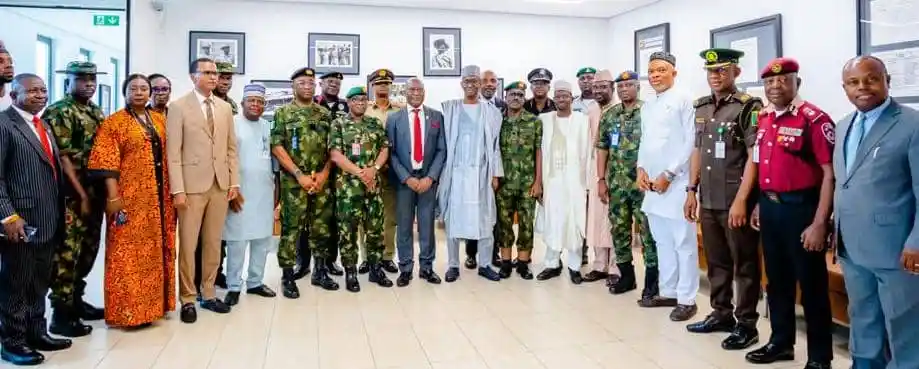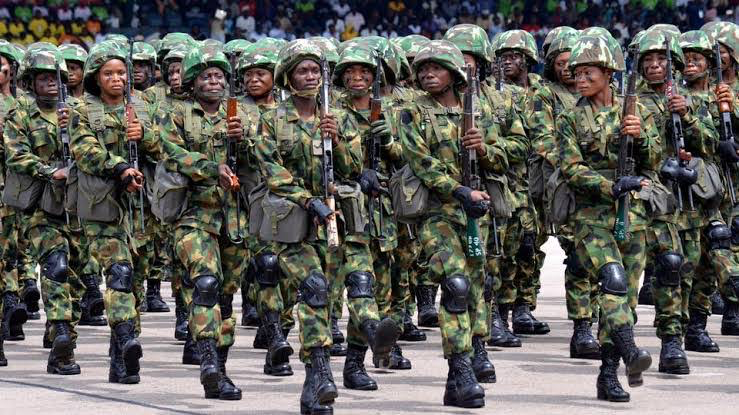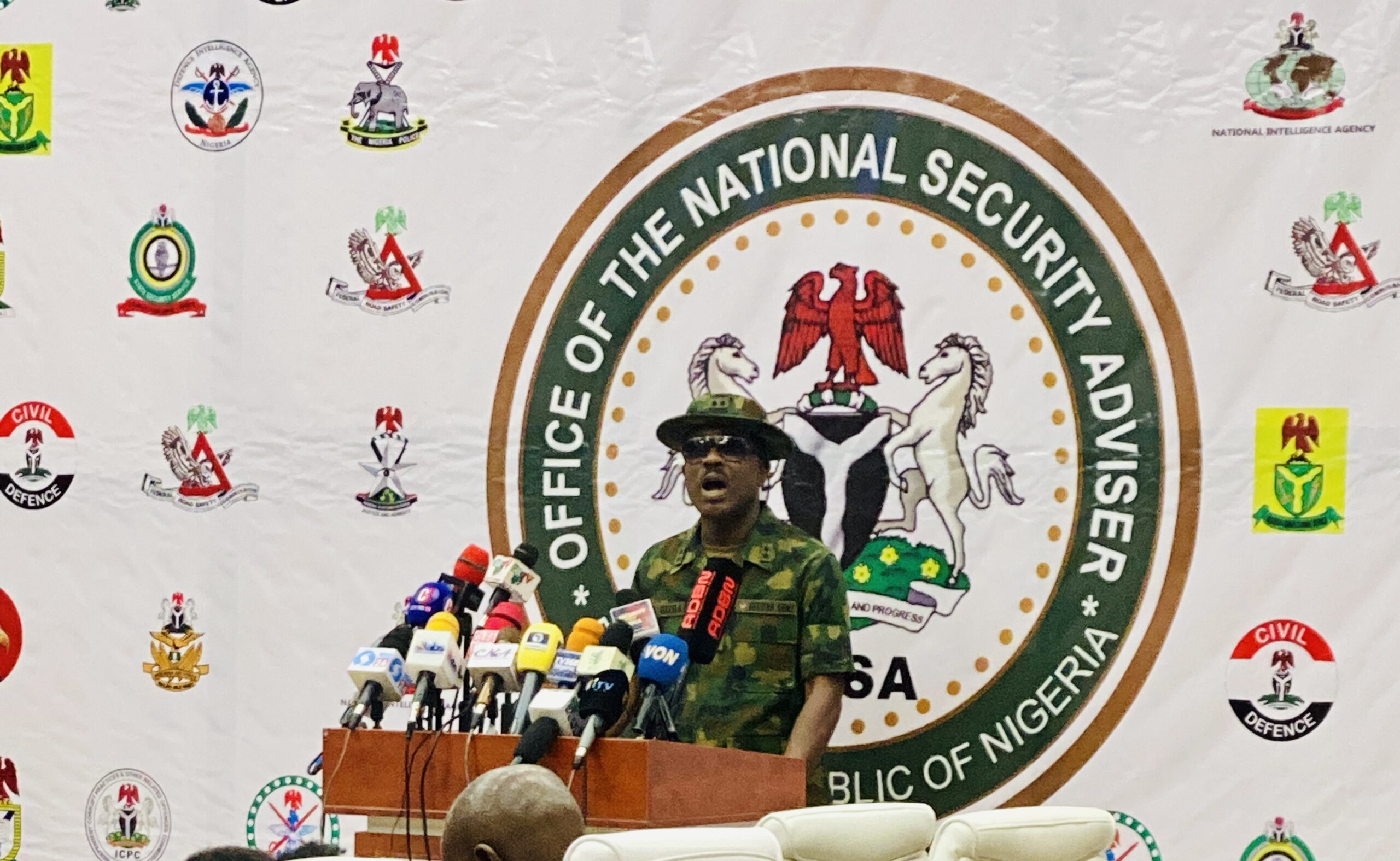The Combined Forces for Security, Defense, Intelligence, and Reconciliation Agency, on Thursday, held its maiden press briefing on troops and personnel’s efforts to end insecurity in the country.
During the briefing, it was revealed that no fewer than 9,303 ISWAP/Boko Haram terrorists had been killed, 6,998 arrested and 9,562 others including families surrendered to security forces in the last one year.
The Combined Forces, under the auspices of the Strategic Communication Interagency Policy Committee, SCIPC, held the briefing at the Defence Headquarters, DHQ, in Abuja.
In his welcome address at the event, Mr. Zakari Mijinyawa, the Spokesperson of ONSA, explained that SCIPC was established under the National Security Strategy 2019 to advise the government on security communication, to strengthen strategic communication, and to strengthen our national security objectives.
“While it has been involved in a lot of policy work, developing patterns, perceiving the directives of the President, and the renewed and advanced efforts by the Cabinet Chief and leaders of security, defense, and intelligence agencies, the SCIPC will now be holding a monthly media briefing. The media is a critical factor in the national security state,” he said.
Mijinyawa further said that the Office of the National Security Adviser has been pivotal in coordinating national security strategies and ensuring synergy among various security agencies.
He said: “Recently, ONSA successfully hosted the High-Level Africa Counter-Terrorism Meeting. The meeting brought together African Heads of Government, including President Bola Ahmed Tinubu, who served as the host President, the UN Deputy Secretary-General, and leaders of other key global bodies.
“‘The discussions during the meeting focused on stability in the Sahel Region. Overall, at the end of it all, the discussions garnered significant commitments to combat terrorism and violent extremism. Relatedly, the Office facilitated the second leg of the UK-Nigeria security and defence dialogue, bringing together security and defence chiefs from both countries.
“Furthermore, in collaboration with the Central Bank of Nigeria, the ONSA initiated a series of economic security measures against currency manipulators and speculators. The office also coordinated efforts in the areas of human security and food security. There were also significant interventions to resolve some national issues. All these are in consonance with an increasing population” centric approach to national security since the beginning of the administration”.
In a presentation, the Director Defence Media Operations, Maj.-Gen. Edward Buba said the troops also rescued no fewer than 4,641 hostages, while 1,437 suspected oil thieves were apprehended within the period under review.
According to him, troops killed 363 criminals and rescued 245 kidnap hostages in the Niger Delta Region within the period.
He said the the Nigerian Police Force within the year apprehended 4,796-armed robbery suspects, 3,068 kidnap suspects and 2,474 suspects for rape/sexual crimes.
The Police also prosecuted 29,052 cases within the year and secured conviction of 16,200 suspects.
He said the Nigerian Security and Civil Defence Corps (NSCDC) on the other hand foiled 48 attacks/kidnap attempts on schools and dismantled over 1,975 illegal mining sites across the country.
He added that 165 illegal local refineries were uncovered and dismantled within the period under review.
“Relatedly, the Nigeria Customs Service generated exceptional revenue of about N4 trillion.
“National security and anti-smuggling efforts led to significant seizures of contraband goods, illegal arms, and narcotics.
“The agencies recovered over 21,000 pump action cartridges, 440 pump action rifles, and 228,741 rounds of ammunition and, prevented potential attacks by recovering suicide jackets and lethal weapons.
“Criminal activities involving illicit petroleum products were disrupted, with 50,000 illicit liters impounded,” he said.
The Full Text of the Briefing below
STRATEGIC COMMUNICATIONS INTERAGENCY POLICY COMMITTEE
Joint Press Briefing by Security, Defence and Response Agencies
6th June, 2024
10:00 am
INTRODUCTION
Gentlemen of the press, esteemed colleagues, distinguished guests, and fellow Nigerians, welcome to this important press conference. Today, we gather under the auspices of the Strategic Communications Interagency Advisory Policy Committee. This committee serves as the umbrella body for the spokespersons of all Nigerian security and response agencies, facilitating unified and strategic communication to highlight the collective successes of our agencies over the past year. These achievements are the result of our coordinated efforts to enhance national security and protect the lives and property of our citizens.
It is important to emphasize that the key to our successes has been robust interagency collaboration, ensuring that our security operations are comprehensive, strategic, and effective.
We acknowledge that not all results can be reported due to the sensitive nature of the information available for ongoing operations, nonetheless we strongly believe that sharing some results from the security and defence sector will go a long way in countering misinformation and also ensuring that citizens are involved in dealing with our security challenges.
SECTORAL UPDATES
THE OFFICE OF THE NATIONAL SECURITY ADVISER (ONSA)
The Office of the National Security Adviser (ONSA) has been pivotal in coordinating national security strategies and ensuring synergy among various security agencies.
The office has, during the period under review, successfully hosted the High-Level Africa Counter-Terrorism Meeting, which brought together African Heads of Government, including President Bola Ahmed Tinubu, who served as the host President, the UN Deputy Secretary-General, and leaders of other key global bodies. These discussions focused on stability in the Sahel Region and garnered significant commitments to combat terrorism and violent extremism.
Relatedly, the Office facilitated the second leg of the UK-Nigeria security and defence dialogue, bringing together security and defence chiefs from both countries. Additionally, in collaboration with the Central Bank of Nigeria, the ONSA initiated series of economic security measures against currency manipulators and speculators.
Coordinating efforts in the areas of human security, food security, and interventions to resolve national issues led to increased citizen-centric approach to national security since the beginning of the administration.
DEFENCE
Gentlemen of the press, the Nigerian Armed Forces, under the leadership of the Defence Headquarters, have made substantial progress in various defence operations, thanks to the interagency collaboration with other security sectors.
In our counter-terrorism and insurgency operations, troops neutralized 9,303 insurgents, arrested 6,998 individuals, and rescued 4,641 hostages. Notably, 9,562 Boko Haram/ISWAP combatant fighters and their families surrendered to security forces. In the fight against oil theft, 1,437 perpetrators were apprehended, with 363 neutralized. Additionally, 245 kidnapped hostages were rescued, leading to a marked decrease in insurgent activities.
ENHANCED MARITIME SECURITY
The Nigerian Navy’s increased patrols and international collaborations have led to a substantial reduction in piracy incidents in the Gulf of Guinea. Notable achievements in the last twelve months include the prevention of oil theft, and denying criminal elements access to an estimated sum of N91,247,052,565. Troops discovered and destroyed 3,051 dugout pits, 1,276 boats, 3,924 storage tanks, and 408 vehicles, recovering significant quantities of stolen crude oil and illegally refined petroleum products, amounting to millions of liters.
INTELLIGENCE
Distinguished guests, the DSS and other intelligence agencies have played a critical role in safeguarding national security through intelligence gathering and covert operations, again enabled by seamless interagency coordination.
Successful intelligence-led operations have prevented numerous terrorist attacks and criminal activities. High-profile terrorist commanders and their associates were apprehended across multiple states, preventing potential catastrophic incidents. Confiscations included illegal items such as IEDs, firearms, ammunition, and dangerous psychoactive substances. Over 21,000 pump action cartridges, 440 pump action rifles, and 228,741 rounds of ammunition were seized, preventing potential attacks by recovering suicide jackets and lethal weapons. Criminal activities involving illicit petroleum products were disrupted, with 50,000 illicit liters impounded. Intelligence dissemination in the South-South region contributed to a reduction in oil theft. New directorates were established to enhance transparency and democratic principles, promoting security and economic stability through intelligence-sharing initiatives.
The intelligence community continuous to provide both foreign and domestic intelligence services that are timely and actionable to Government. Abroad, Intelligence activities track dissidents and secessionists, transnational organized crime involving Nigerians such as drug trafficking, human trafficking, fraud, cybercrime, money laundering, and immigration-related crimes.
Additionally, key agencies have maintained collaboration with foreign services, identified opportunities and challenges in furthering common national, regional and international priorities set by Government. This has led to effective representation of Nigeria in regional and continental security platforms such as the ECOWAS, CISSA and other regional and continental organizations.
LAW ENFORCEMENT
NIGERIA POLICE FORCE AND OTHER LAW ENFORCEMENT AGENCIES
Members of the press, the Nigeria Police Force and other law enforcement agencies have undertaken significant reforms and operations to enhance public safety.
Key achievements include restructuring and reforming the intelligence department and reopening the Nigeria Police Intelligence School. The launch of the Special Intervention Squad (SIS) and collaboration with international partners, alongside the Schools Protection Initiative and the deployment of helicopters for train escorts along the Abuja-Kaduna route, have enhanced security measures. Digital support systems like the Nigeria Police Force Rescue Me App have been relaunched, leading to significant successes.
Arrests include 4,796-armed robbery suspects, 3,068 kidnap suspects, 2,474 suspects for rape/sexual crimes, 1,213 suspects for unlawful possession of firearms, 3,523 suspected cultists, 3,381 suspects for murder/homicide, and 13,382 suspects for other offences. Additionally, 1,713 kidnap victims were rescued, and 2,566 firearms and 19,310 rounds of ammunition were recovered, along with 1,465 vehicles/motorcycles. Also, during the period under review, the Nigerian police prosecuted 29,052 cases. Of these, 7,675 cases were conclusively dispensed, 11,376 suspects are currently undergoing trial, 51 cases are under appeal in appellate courts, and 16,200 cases resulted in the conviction of suspects who have received various punishments for their criminal acts.
Similarly, the Nigerian Security and Civil Defence Corps (NSCDC) recorded significant feats to bolster internal security and secure critical infrastructure. Key achievements include the establishment of the National Safe Schools Response Coordination Centre (NSSRCC), foiling over 48 school attacks and kidnap attempts nationwide. The launch of the CG’s Mining Marshall combated illegal mining activities, dismantling over 1,975 illegal mining sites. Over 165 illegal local refineries were uncovered and dismantled, and enhanced communication initiatives promoted public awareness and sensitization programs.
CUSTODIAL MANAGEMENT
Custodial management plays a pivotal role in law enforcement, ensuring the proper care, rehabilitation, and reintegration of inmates into society. In the past year, the Nigerian Correctional Service has focused on enhancing custodial practices.
Key achievements include enhanced inmate training and productivity, increased revenue from Correctional Farm centers and Vocational Skill Workshops, and educational advancements for inmates. Inmate welfare has been improved with the distribution of beddings, uniforms, and hygiene materials, alongside ensured access to healthcare services. Staff welfare enhancements saw the promotion of over 10,000 officers and men, and improved working conditions. Efforts to decongest custodial centers through fines, renovations, and expansions have also been significant.
Also, non-custodial services have been upscaled. The NCoS has adopted non-custodial measures such as community service, parole, probation and restorative justice in offenders’ management thereby significantly reducing custodial population, saving revenue for the government and engendering proper and effective reformation and rehabilitation of offenders. In general, this has helped to enhance public safety and National Security
ANTI-CORRUPTION CRUSADE/ EFFORTS TO COMBAT CYBERCRIME
The lead agencies in the fight against corrupt practices mainly the Economic and Financial Crimes Commission (EFCC) and the Independent Corrupt Practices Commission (ICPC) have played a significant role in maintaining law and order through their anti-corruption initiatives. The Economic and Financial Crimes Commission (EFCC) made significant progress in the fight against economic and financial crimes, securing 3,412 convictions and recovering vast sums of money both in local and foreign denominations. The recovered amounts include N161,642,239,242.30 (One Hundred and Sixty Billion, Six Hundred and Forty-Two Million, Two Hundred and Thirty-Nine Thousand, Two Hundred and Sevene Naira, Thirty Kobo), $43,835,214.24 (Forty-Three Million, Eight Hundred and Thirty-Five Thousand, Two Hundred and Fourteen Dollars, Twenty-Four Cents), £25,365.00 (Twenty-Five Thousand, Three Hundred and Sixty-Five Pounds), €186,947.10 (One Hundred and Eighty-Six Thousand, Nine Hundred and Forty-Seven Euros, Ten Cents), ₹51,360.00 (Fifty-One Thousand, Three Hundred and Sixty Rupees), C$3,750.00 (Three Thousand, Seven Hundred and Fifty Canadian Dollars), A$740.00 (Seven Hundred and Forty Dollars), ¥74,754.00 (Seventy-Four Thousand, Seven Hundred and Fifty-Four Yen), R35,000.00 (Thirty-Five Thousand Rand), 42,390.00 UAE Dirhams (Forty-Two Thousand, Three Hundred and Ninety Dirhams), 247.00 Riyals (Two Hundred and Forty-Seven Riyals), and 21,580,867.631 Crypto Currency (Twenty-One Million, Five Hundred and Eighty Thousand, Eight Hundred and Sixty-Seven Crypto Currency Units, Six Hundred and Thirty-One Cents).
The EFCC has also taken bold steps to combat corruption, including the investigation of several politically exposed persons including former ministers and governors, and the launch of a crackdown on internet fraudsters and currency racketeers, securing over 50 convictions.
The EFCC’s Special Task Force against Naira Abuse and Dollarization of the Economy is working to protect the sanctity and strength of the Naira. To prevent corruption, the EFCC has established a Fraud Risk Assessment and Control department (FRAC) to identify vulnerabilities in government agencies and launch preventive measures.
Meanwhile, Key achievements and initiatives of ICPC includes the recovery and forfeiture of assets, recovering over N66 billion in cash and rent on forfeited assets. Assets worth N5.882 billion were restrained, and N366.97 million was forfeited through judicial processes.
Investigations and prosecutions saw 131 investigations and 18 convictions. Education and training programs were organized with 25 training sessions and 2,244 participants. Public awareness initiatives implemented diverse public education and enlightenment programs.
NIGERIA CUSTOMS SERVICE
Exceptional revenue generation reached ₦3,991,988,348,853.32. Trade facilitation initiatives included the implementation of the Time Release Study (TRS), the Advance Ruling system, and the Authorized Economic Operator (AEO) Program. Capacity building and technological advancements enhanced officers’ skills and automated processes. Infrastructure development upgraded customs infrastructure and strengthened operational capacity. Strengthened stakeholder engagement facilitated a more integrated approach to customs operations. National security and anti-smuggling efforts led to significant seizures of contraband goods, illegal arms, and narcotics.
NIGERIA IMMIGRATION SERVICE
The e-Border Project implementation saw the deployment of e-Gates solutions for border governance. Enhanced border patrol and surveillance included the launch of 30 operational vehicles. Infrastructure development projects were completed, including the e-Border Data Centre. Automation of passport processing improved service delivery through full automation. Integration of solar power systems ensured uninterrupted operations. Technological upgrades facilitated seamless integration with border control systems. Public sensitization and enlightenment raised awareness about the dangers of irregular migration.
Furthermore, the Command-and-Control Center for operations of API/PNR system was completed while E-gates for passenger clearance at 5 major international airports were deployed.
EMERGENCY RESPONSE
Effective emergency response is the bedrock of national resilience and security. NEMA, Federal Fire Service, and the Federal Road Safety Corp have been leading agencies in providing emergency response.
NEMA’S KEY ACHIEVEMENTS
NEMA has stepped-up timely response in the coordination of intervention efforts in the forms of search and rescue in various disasters situations that include fire incidents in Lagos, Adamawa, Maiduguri, explosions in Ibadan and Kano, etc.
The agency also conducted a detailed assessment of the disaster incidents in collaboration with the State Emergency Management Agencies (SEMAs) and provided relief support to the affected persons.
NEMA delivered 42,000 metric tonnes of food commodities nationwide and provided relief to communities affected by drone bombings in Kaduna State.
FEDERAL FIRE SERVICE
The Federal Fire Service has made significant progress in procurement and distribution, human capacity development, and projects. The service has procured and distributed eight firefighting trucks and 15 Ford-built rapid intervention trucks to various commands across the country. Additionally, plans are underway for the construction of a corporate headquarters in Abuja, and the rehabilitation of existing buildings at the National Fire Academy. The service has also conducted various training programs for officers and men, resulting in the promotion of 1,680 personnel and the conversion/upgrading of four officers.
The Federal Fire Service has also collaborated with various organizations, including the Armed Forces Command and Staff College, the Nigerian Defence Academy, and the United States of America, to enhance its capacity. The service has responded to 1,739 fires, saved 543 lives, and prevented an estimated property worth ₦2.058 trillion from damage between April 2023 and March 2024. The response time to emergencies has also improved from 25 minutes to 15 minutes. Furthermore, the service has conducted fire prevention and safety awareness campaigns, and provided security support during off-cycle elections in various states.
FEDERAL ROAD SAFETY CORP KEY ACHIEVEMENTS
The Federal Road Safety Corp achieved notable reductions in road traffic crashes (RTC). The addition of patrol vehicles, ambulances, tow trucks, and motorbikes improved response capabilities. The construction of office complexes and the establishment of area and unit commands enhanced operational efficiency. Recruitment of 3,537 personnel and the introduction of new laws like the FRSC Training Institution Establishment Act, 2023, and the Speed Limiter Pre-Fixing Regulation 2024 improved road safety measures. Collaboration with the Dangote Group focused on improving road infrastructure and safety measures.
FUTURE OUTLOOK
Looking ahead, our security agencies will focus on the following strategic priorities:
a. Strengthening intelligence-sharing mechanisms to preempt and counter security threats more effectively.
b. In line with the whole-of-government approach, all agencies will strengthen mechanisms to ensure a people-oriented approach to securing our communities.
c. Investing in advanced technologies and equipment to enhance the capabilities of our security forces.
d. Deepening partnerships with international allies to tackle regional and global security challenges and leverage best practices.
CONCLUSION
Ladies and gentlemen, in conclusion, we extend our heartfelt gratitude to all Nigerians for their unwavering support and cooperation. As we continue to strive for a safer and more secure nation, we call upon all citizens, the private sector, NGOs, religious communities, and other stakeholders to support our efforts. The success we’ve achieved so far has been made possible through the strength of our interagency collaboration. Together, we can achieve even greater security and prosperity for our country.
By PRNigeria



